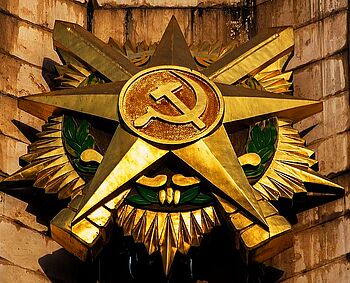Ethiopia was ruled for 17 years by a Marxist-Leninist dictatorship. After years of fighting, the regime was overthrown by rebel forces in 1991. After more than a quarter of a century of authoritarian rule, people are now pinning their hopes on the reform-minded prime minister Abiy Ahmed.
Credit: Bundesministerium für Europa, Integration und Äußeres / CC BY
The Legacy of the Dergue Regime

Credit: Andrew Moore / CC BY-SA 2.0
Ethiopia – officially the Federal Democratic Republic of Ethiopia – is a land-locked country in Africa. Around 112 million people of different ethnicities live here on an area of 1.1 million square kilometers. More than half of the population identifies with the predominant Ethiopian Orthodox Christianity and somewhat fewer with Islam.
Following the collapse of the monarchy under Emperor Haile Selassie, a military junta called “Dergue” took power in 1974. Under its chairman, Mengistu Haile Mariam, it proclaimed Marxism-Leninism to be the state ideology. More than 100,000 “class enemies” and opponents of the new socialist order were imprisoned, tortured or executed. The regime is also regarded as partially responsible for a severe famine that cost more than a half million lives between 1984 and 1985. In 1987 Mengistu proclaimed the People’s Democratic Republic of Ethiopia – a one-party state modeled after the Soviet Union.
After many years of civil war, in 1991 the Dergue regime was overthrown by the Ethiopian People’s Revolutionary Democratic Front (EPRDF) and the Oromo Liberation Front (OLF). However, the OLF left the new transitional government after one year. In 1995, the EPRDF established Ethiopia as a federal republic, but it continued to govern by authoritarian rule. The People’s Liberation Front of Tigray became the dominant power.
In 2018, the new prime minister and EPRDF chairman Abiy Ahmed lifted the state of emergency in Ethiopia and released several political prisoners. He also signed a peace treaty with Eritrea, which had seceded 25 years earlier. In 2019, he was awarded the Nobel Peace Prize for this (as of April 2020).
Federal Democratic Republic of Ethiopia
Area: | 1,104,300 km² | |
|---|---|---|
Inhabitants: | 112 million (2019, estimate) | |
Population growth: | 2.9% annually (2017, estimate) | |
Population density: | 95 inhabitants per km² | |
Seat of government: | Addis Ababa | |
Official language: | Amharic (common language) | |
Political system: | Parliamentary democracy | |
Head of state: | Sahle-Work Zewde (since 2018) | |
Head of government: | Dr. Abiy Ahmed Ali (since 2018) | |
Freedom status: | 24/100 | |
GDP per capita: | 2.333 USD (adjusted for purchasing power, 2018) | |
(ኢትዮጵያ)
(تونس)
(République démocratique du Congo)
(الصومال)
(جيبوتي)
(مصر)
(الجزائر)
(Côte d'Ivoire)
(إرتريا)
(The Gambia)
(Cameroun)
(République du Congo)
(ليبيا)
(المغرب)
(موريتانيا)
(Moçambique)
(السودان)
(South Sudan)
(تشاد)
(الصحراء الغربية)
(République centrafricaine)